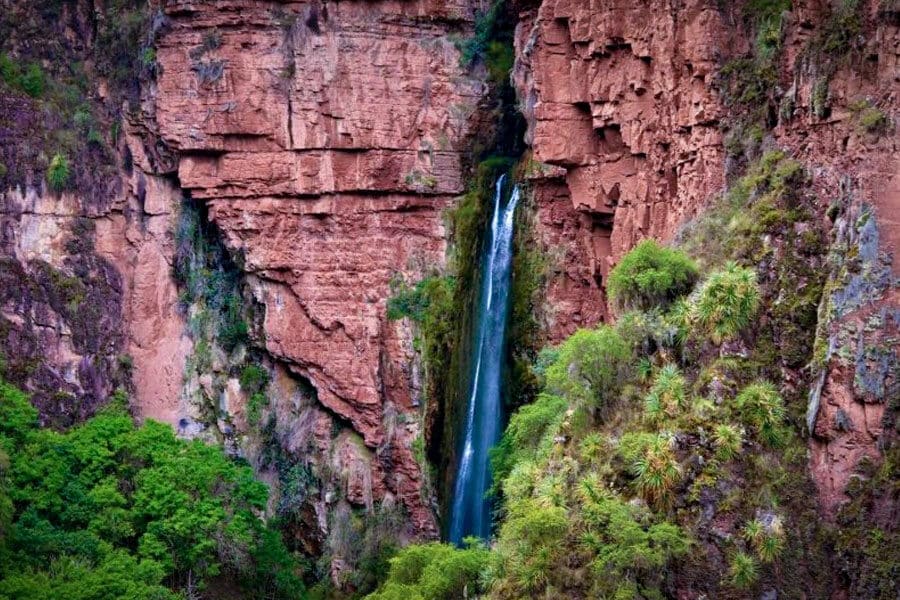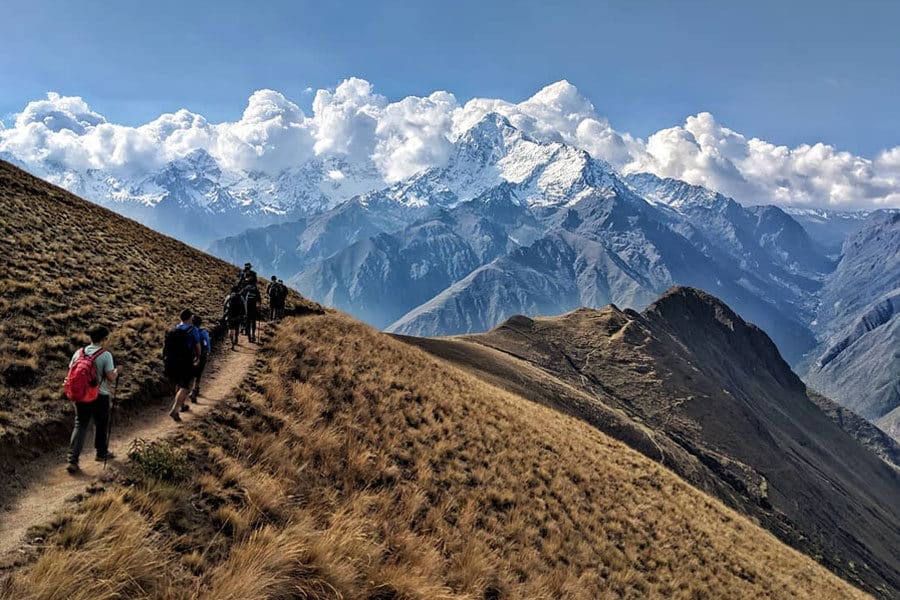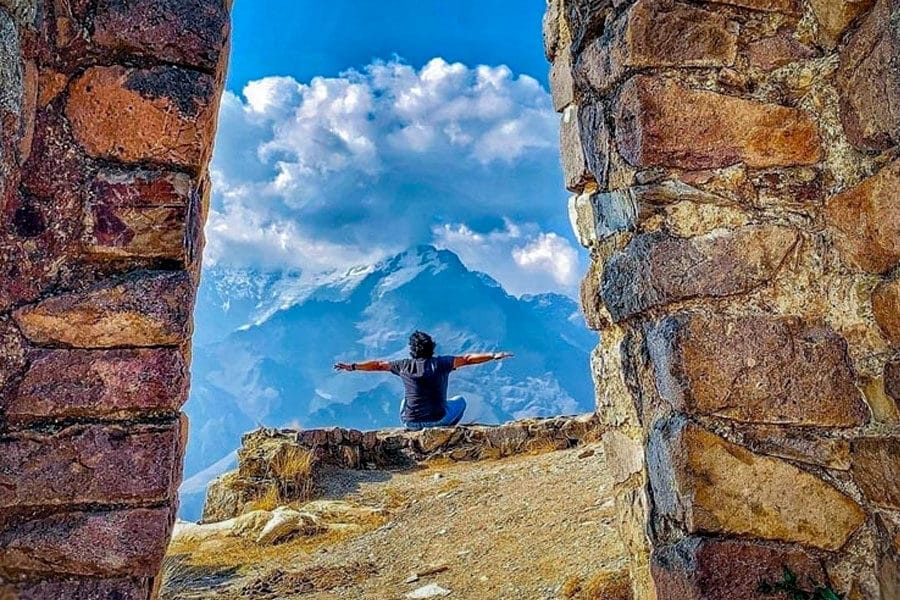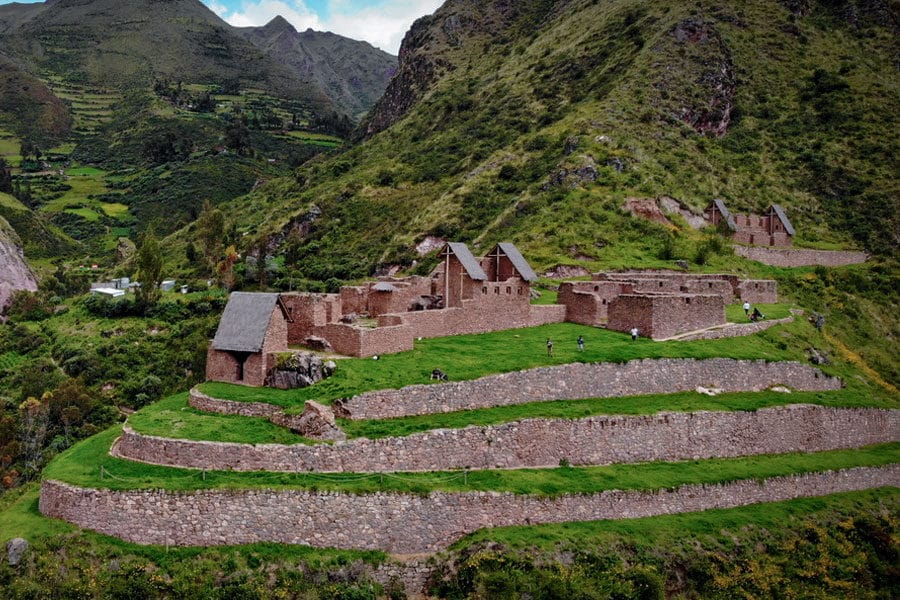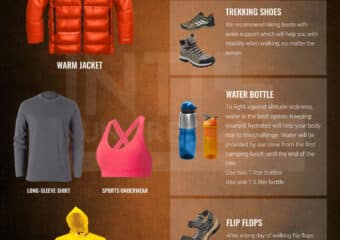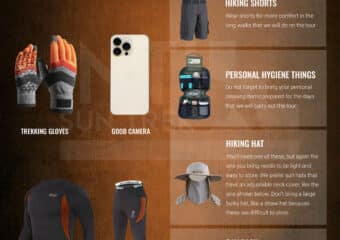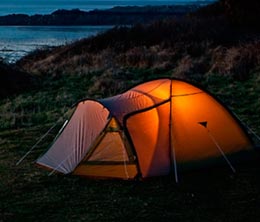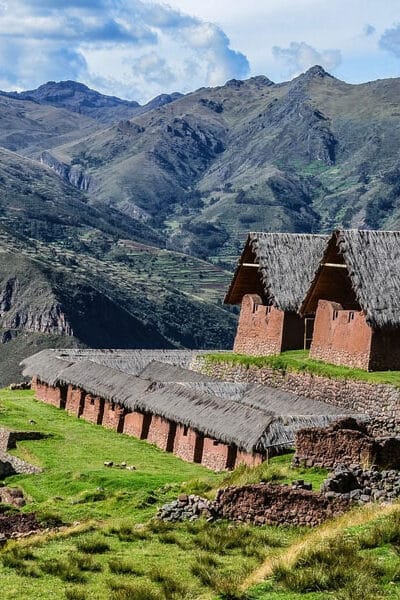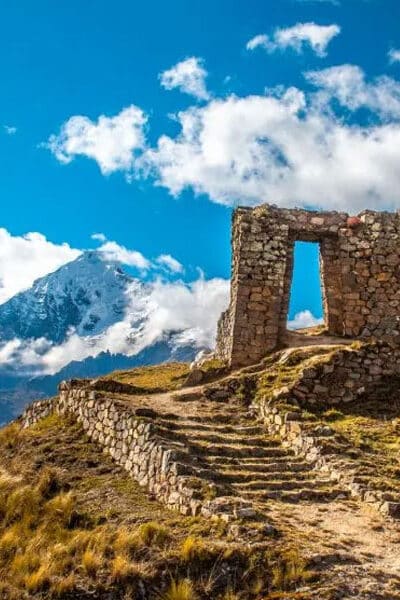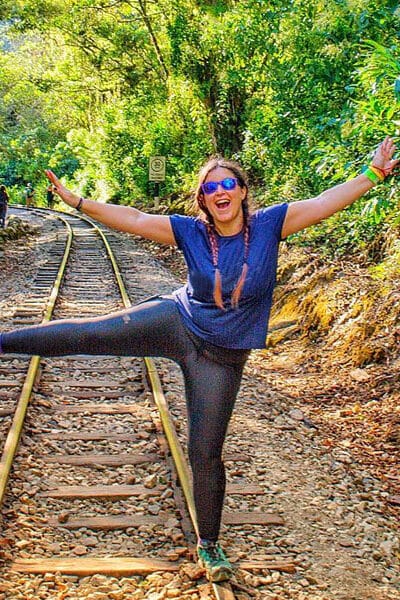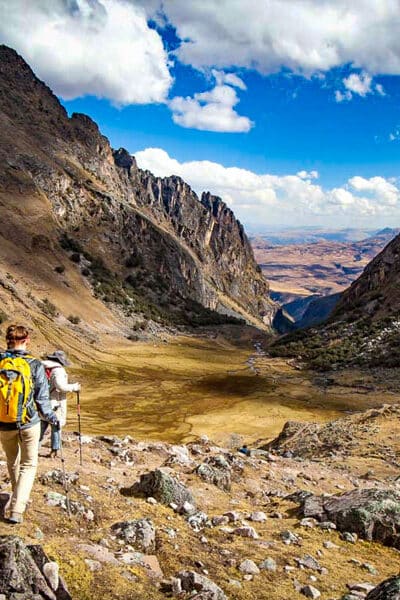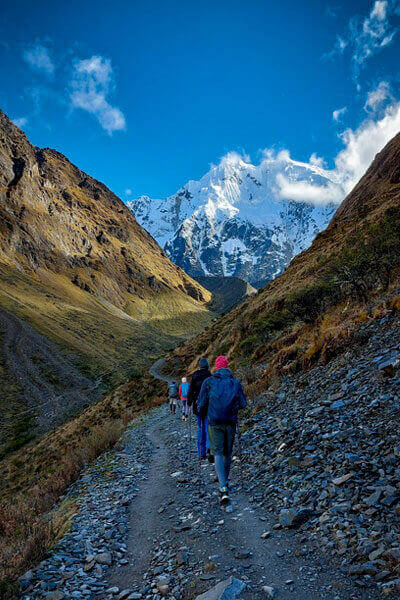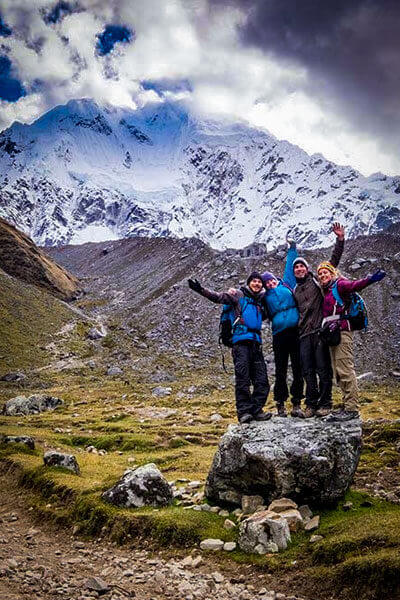The Inca Quarry Trek 4 day / 3 nights is one of the best alternate routes to Machu Picchu. On the Inca Quarry trek, you will visit some little-known Inca ruins like Ñaupa Iglesia, Qorimarca site, and the Perolniyoc waterfall and trek through amazing landscapes as you make your way to Machu Picchu. This trek will also take you to an amazing Inca temple Inti Punku above Ollantatambo that was built as a shrine to the snow-capped mountian Veronica. The quarry itself will give you an insight into the incredible craftsmanship and engineering skills of the Incas. If you dare, you will even get to peer inside Incan tombs which still contain the human skeletal remains of those who chose to sacrifice themselves to the sacred mountain. You will be impressed by the history and panoramic views that this tour has to offer.
- 100% Operated by Inti Sun Trek, we never put you with other tour operators.
- Porters that will carry your personal belongings (up to 6kg/ 12lbs) – no extra fee
- You will hike only with your day pack which is way more comfortable than carrying a big bag!
- Small intimate group, will provide you a big adventure
- Pick-up and drop-off from your hotel in Cusco
- Hike through the Vilcabamba Mountain Range and pass through stunning landscapes, varying from the tropical Cloud Forest, to the high Andes on this beautiful
- Camp the first night, surrounded by stunning views of the snow-capped peaks mountain.
- Pass through different micro-climates. Your scenery will constantly be changing.
- Experience the most popular itinerary of the Alternative Treks.
- Enjoy more the nature than big groups of tourist.
Peru
Inca Quarry Trek to Machu Picchu 4D / 3N
Summary
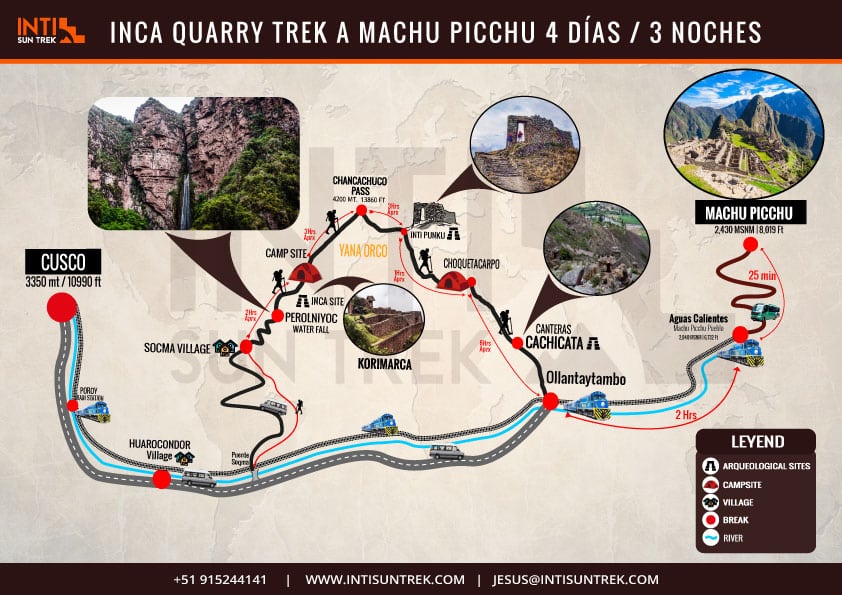
Overview Inca Quarry Trek to Machu Picchu 4 days / 3 nights
Day 1: Cusco – Raf´qa – Soqma – Q´orimarca
Early in the morning, at 5:00am, we will start our bus ride to Tinki, the starting point of this hike. From Tinki, a place filled with a great number of native professional mountain climbers, we will walk along the plains surrounding the Ausangate mountain. Our destination for the day will be Pachchanta a local community of llama and alpaca herders.
- Meals: Lunch – Afternoon Tea Time -Dinner
- Accommodation: Camping with 4 season tents
- Distance: 12kms/7.5 miles
- Time: 6 hours approximately
- Difficulty: Moderate.
Day 2: Q´orimarca – Inti Punku – Choquetacarpo
Early in the morning, at 5:00am, we will start our bus ride to Tinki, the starting point of this hike. From Tinki, a place filled with a great number of native professional mountain climbers, we will walk along the plains surrounding the Ausangate mountain. Our destination for the day will be Pachchanta a local community of llama and alpaca herders.
- Meals: Breakfast – Lunch – Afternoon Tea Time – Dinner
- Accommodation: Camping Facilities with 4 season tents
- Distance: 15kms/9.5 miles
- Time: 7 hours approximately
- Difficulty: Moderate/Difficult
Day 3: Ancient Quarry- Veronica Temple – Ollantaytambo-Train to Aguas Calientes.
Early in the morning, at 5:00am, we will start our bus ride to Tinki, the starting point of this hike. From Tinki, a place filled with a great number of native professional mountain climbers, we will walk along the plains surrounding the Ausangate mountain. Our destination for the day will be Pachchanta a local community of llama and alpaca herders.
- Meals: Breakfast – Lunch – Dinner
- Accommodation: in Aguas Calientes
- Distance: 8kms/5 miles
- Time: 6 hours approximately
- Difficulty: Moderate
Day 4: Aguas Caliente- Machu Picchu- Cusco
Early in the morning, at 5:00am, we will start our bus ride to Tinki, the starting point of this hike. From Tinki, a place filled with a great number of native professional mountain climbers, we will walk along the plains surrounding the Ausangate mountain. Our destination for the day will be Pachchanta a local community of llama and alpaca herders.
- Machupicchu elevation: 2400 meters / 7873 ft
- Difficulty: Easy
- Weather: warm
New Regulations
In January 2019, changes to the Machu Picchu visitation rules were implemented. Now, entrance tickets to the citadel are sold for specific time slots, starting at 6:00 AM, 7:00 AM, 8:00 AM, 9:00 AM, 10:00 AM, 11:00 AM, 12:00 PM, 1:00 PM, and 2:00 PM.
With this new entry system, visitors board the bus to Machu Picchu one hour or 30 minutes before the visitation time printed on their ticket. This way, they do not have to endure unnecessary queues in Machu Picchu Pueblo, nor do they contribute to crowding at the entrances to the Inca city.
Meanwhile, visitors who wish to walk to Machu Picchu must depart one and a half hours before their designated visitation time.
In January 2021, new visitation routes or circuits were introduced at Machu Picchu with the aim of preserving the archaeological site for future generations. Each visitor follows a circuit according to the type of entrance ticket they have purchased, whether it’s for visiting Machu Picchu only, Huayna Picchu mountain, or Machupicchu mountain.
For more detailed information about the different circuits and specific entrance schedules, we invite you to read this link on Schedules and New Circuits for Visiting Machu Picchu or to contact us directly. We can provide you with all the necessary information and address any questions you may have.
Itinerary
Day 1: CUSCO – RAF´QA – SOQMA – Q´ORIMARCA
Highlight of the day: Takes us to the hypnotizing Perolniyoc Cascade, a wonderful opportunity to stop, take photos and have a snack.
We leave Cusco early in the morning and drive for 2 hours to Choquequilla, a small ceremonial place where the Incas historically would honor the moon. A short drive from here takes us to Rafq’a, time to lace up your boots at the starting point of our trek where we meet the horsemen for our hike. We hike for about 1 hour to reach the small transverse and typical community of Socma. Just a hop, step and jump ahead, takes us to the hypnotizing Perolniyoc Cascade, a wonderful opportunity to stop, take photos and have a snack. Our goal is to reach our campsite at 3700m or 2139ft at about lunch time. After lunch we set off to explore the Q’orimarca archeological site, which was used to serve as a check point during the times of the Incas.
PLEASE NOTE: Many alternative treks to Machu Picchu only offer beautiful landscapes along the way, but this trek also offers tours of many Inca sites!
Day 2: Q´ORIMARCA – INTI PUNKU – CHOQUETACARPO
Highlight of the day: This is the most challenging but most rewarding day of the hike
This is the most challenging but most rewarding day of the hike. A 3 hour walk takes us to the top of the first pass, known as Puccaqasa (4370mts). After enjoying the picturesque views of the undulating valleys below, we descend down for 30 minutes, just in time for lunch.
Rested and full of energy again, we head onward and upward for about 2 hour to the highest pass of the trek: Kuychicassa (4450m/14599ft). From here, we head down for 2 hours to the site that the Incas called Inti Punku, (meaning Sun Gate) with its imposing views over the valley and the horizon is engulfed by the Veronica Mountain. Our campsite is a short distance away at Choquetacarpo (3600m/11811ft)
Day 3: Ancient Quarry- Veronica Temple – Ollantaytambo-Train to Aguas Calientes.
Highlight of the day: We can personally witness the workmanship of the Incas, which they could not complete due to the Spanish Conquest.
Day 3 is all downhill hiking, with our first stop at the Kachiqata Quarry where we can personally witness the workmanship of the Incas, which they could not complete due to the Spanish Conquest. Midday we arrive at the town of Kachiqata, the end of this challenging and fascinating trek. From here we visit the original Inca settlement Ollantaytambo and in the afternoon we travel by train to Aguas Calientes where we stay overnight at our private hotel.
Day 4: Aguas Caliente- Machu Picchu- Cusco
Highlight of the day: Exploring the amazing Machu Picchu and learning all of its secrets.
After breakfast, our guide will pick you up from your hostel/hotel and lead you to the bus station where you will board a bus to Machu Picchu. At Machu Picchu, you will have a 2 hour walking tour of this mysterious city, followed by free time for your own exploration. In this time, you may also choose to climb Huayna Picchu or Machu Picchu Mountain if you have reserved a spot. Once you have completed your tour of Machu Picchu, you will take the bus to Aguas Calientes, where you can stop for lunch. Finally, after an amazing journey, you will head to the train station to take the train for your return trip to Cusco.
Price
Group Tour – $580 USD per person
Group Tour -$560 per person (without hotel in Aguas Calientes)
The cost of the tour packages are based on double or matrimonial room. For an individual room an 15 dollars extra payment has to be made.
To book the Inca Quarry Trail to Machu Picchu, you need to make an initial payment of 200.USD per person, the remaining balance can be paid online, in installments, or Cusco with any credit card
Please notice: Our Trek service begins and ends in your hotel in Cusco
Important Notice Regarding Student Discounts:
The ISIC card is no longer valid for purchasing Machu Picchu or Inca Trail tickets with a student discount.
Students can still obtain this discount with their student identification card issued by the university where they study, which is the only valid document for this end at this time. For more information, please visit the following link: http://www.machupicchu.gob.pe/items/estudiantes.html
Returning train Included in the cost of this tour/trek is the Expedition train, which departs either at 6:20 pm or 7:00 pm and DEPENDING ON AVAILABILITY.
Can I get an early train ticket?
We can also book an afternoon train that departs 2:55 p.m. or 4:22 p.m. at an extra cost of US $35 per person the train we will book DEPENDS ON AVAILABILITY.
Please, notice that 35 dollars extra you will pay also will cover your private transportation to bring you back from Ollantaytambo train station to your hotel in Cusco
There is also an option to upgrade your train to the Vistadome train which is the extra US $75 per person. Please let us know your preference at the time of booking the tour. Unfortunately, none of the trains go straight to Cusco—they run either to Ollantaytambo or Poroy. In either case, we will transfer you back by bus to Cusco.
Can I change my return train ticket by myself?
At the time of your tour, it may be possible to make changes to your return train ticket if you don’t want to take the 18:20 p.m train. You will have to take your train ticket personally to the train station in Aguas Calientes and ask them to change the return ticket for an early one. You will probably be asked to pay an extra administration fee, which will depend on the train service and departure time. Please notice that once you will change your returning train you will responsible to cover your own transportation back to Cusco
How long is the journey back to Cusco?
You will be traveling for approximately 3 hours before you arrive back in Cusco. First, you will travel for 1.5 hours by train to the Ollantaytambo train station. Then you will be picked up by your driver outside of the train station. The driver will be holding a sign with your name on it so that there will be no confusion. If you do not see the driver initially, wait for them outside of the train station. Once the driver has picked you up, you will travel for another 1.5 hours in a private van/car to your hotel/hostel in Cusco. Arrival time in Cusco will depend on train availability. You will receive your return train tickets once your guide has finished your walking tour of Machu Picchu.
Inclusion
Included Inca Quarry Trek to Machu Picchu 4 days / 3 nights
- Basic hotel night in Aguas Calientes double or triple rooms, private bathrooms, hot showers, wifi, and storage while you visit Machu Picchu
- Weight allowances: 6kl/12lb per trekker (weights to be carried by horses and mules you will trek only with your day pack which is way more confortable than carrying a big bag!)
- Horse (to carry tents and cooking equipment and the 6 kl/12lb of personal belongings)
- Wrangler’s health insurance paid for by INTI SUN TREK
- Transport: collection from your hotel in the morning and transfer in private transportation to the starting point of the trek
- A Professional tour guide who is fluent in English
- Machu Picchu entrance fees
- Included in the cost of your tour is one-way bus tickets up from Aguas Calientes to Machu Picchu on the day you will visit citadel. However, bus tickets down from Machu Picchu to Aguas Calientes after your walking tour in Machu Picchu are not included, in the interest of reducing your costs. You may either walk back down to Aguas Calientes (about one hour) or pay for the bus tickets at the Machu Picchu site exit.
- Two hours walking tour in Machu Picchu
- Personal tents: We use 4 men, tents that only need to be shared by 2 people. This allows some room to spread out and keep your duffels safely with you.
- Sleeping mattress(pad)
- Meals cooked by an experienced chef: breakfasts, lunches, dinners, and snacks!
- Delicious food rich in carbohydrates and suitable for trekking
- All our food is prepared from organic vegetables and fresh ingredients
- Vegetarian/special diet options available
- Water (we will provide you with boiled and filtered cold water during the trek starting on the second day. However, you will need to bring a container to carry your water in. Also, you need to ensure that you pack a sufficient amount of water for the first day of the trek.
- We strongly recommend to bring your Camel Back and water canteen due to that government of Peru will not allow disposable plastic bottles anymore on the Inca trail and in Machu Picchu.
- Wake up tea: every morning at the campsites we will wake you up with a cup of coca tea and coffee
- Daily snacks- day 1,2 and 3: our snacks consist of local fruits, biscuits, chocolate, Caramels we will give this snack at the beginning of each day trek
- First aid kit including an emergency oxygen bottle and a horse you may ride on if the altitude effects your ability to complete the trek
- Dinner in Aguas Calientes on Day 3
- Breakfast in Aguas Caliente on Day 4
- Expedition train from Aguas Calientes to Ollantaytambo
- Bus from Ollantaytambo to Cusco
Not included:
- Sleeping bags
- Breakfast on the first morning.
- Bus ticket from Machu Picchu to Aguas Calientes
- Drink( coke, mineral water or cerveza) in the dinner in Aguas Calientes on the 3 day
- Lunch in Aguas Calientes on the final day
- Entrance to the thermal springs in Aguas Calientes (20 soles)
- Tip for the guide. cook, and wranglers
Packing list
What you need to bring:
ESSENTIALS:
- Original passport
- Sleeping bag
- Immigration Card (given on the plane as you enter Peru)
- Good daypack ( smaller, the better)
- Water storage: we strongly recommend to bring your Camel Back and water canteen due to that government of Peru will not allow disposable plastic bottles anymore on the Salkantay Trek and in Machu Picchu.
- Comfortable hiking boots (lightweight with good soles)
FOR YOUR DUFFEL:
Porters will carry up to 6 kg of your personal items. This must include your sleeping bag and air matt (if you bring/rent one). From us these two items weigh 3.5 kg.
- 2-3 wicking t-shirts
- 2-3 hiking pants
- 4 sets of undergarments.
- 4 sets of hiking socks
- 1 Fleece
- 1 Warm, down jacket: gets very cold at night
- 1 Rain jacket and pants
- 1 sun hat
- 1 wool hat
- Headlamp: essential
- Waterproof gloves (even if they are ski gloves, take them)
- Comfortable shoes for camp
- Walking boots
- Waterproof jacket/rain poncho
- Quick-dry towel. We provide small ones, you might enjoy something a little larger.
- Small bottle of soap: we provide warm water each day to clean – might make you feel fresh if you had a little soap.
- Battery Charger: There is no place to plug in while trekking!
- Large plastic bags: to help organize and keep clean from dirty.
TOILETRIES:
- Sunscreen
- Face moisturizer
- Bug spray
- Hand sanitizer
- Wet wipes
- Toothbrush and paste
- Toilet paper
- Personal medication
- First aid kit: band-aids, moleskin, etc.
INSIDE YOUR DAYPACKS:
Daypacks can be any size for hiking, but we always recommend the smaller, the better. Inside Machu Picchu, no bag larger than 25L will be allowed in. If larger, you will need to store outside citadel gates.
- Water beginning from your second day will supply all the water needed. This water will be boiled, filtered and then cooled, before distributing. You must supply your own water bottles or Camel Back. We recommend carrying about 2L worth. We will refill our waters at each meal
- Sunhat
- Rain gear
- Fleece
- Camera
- Music (iPhone)
- Hand sanitizer
- Toilet paper and a small plastic bag for waste
- Extra Money for Souvenirs, Drinks & Tips
- Earplugs
Before you go
What will the personal porter carry?
For the Inca Quarry trail, ,we will provide you with a duffel bag at the briefing for the Trek the night before we depart. to put all of your belongings in. By using standardized bags, we will ensure that all of your belongings will fit properly on the horses. The duffel bags easily fit 6 Kilograms /12 pounds per person including your sleeping bags.
However, You will still need to carry your day pack with all of your essentials like water, sunscreen, passport, etc
When will I receive my duffel bag to put my belongings in?
We will lend you one of our specially designed duffel bags at the briefing for the Trek the night before we depart. We use these bags to insure that they fit securely and comfortably on the porters´ backs.
Pre-Trek Briefing
All briefings are done at our office at 6:00 PM the night before your trek. If you are unable to make this time, you need to coordinate another time with a member of the Inti Sun Trek office team. Briefings are approximately 30 -45 minutes long.
Renewal or change passport number?
If you plan to renew or change your name on your passport between making your trek booking and starting your trek, you can book your trek or tour with your current passport number or name, but you must send us a copy of your old passport and a copy of your new passport when you have them. We can then make the change with the government before you arrive. The extra cost to make the change is US$25 per person. (This will cover the change in number or name for your Inca Trail Permit, Machu Picchu Entrance, and train.)
If you do not advise us of the change or do not want to pay the fee, bring the original of both passports (the old and new one). You can enter Peru with your new passport but you must show the government authorities your old passport in order to enter the Inca Trail, Machu Picchu or train. If you cannot do so, you will not be allowed to start your trek by the government officials. All names and numbers must match!!
Pickups
Inti Sun Trek is one of the only companies to pick you up directly from your hotel. As long as your hotel is in the center of Cusco city,we will coordinate this pickup based on a time that your guide will discuss at the briefing. Pick up times may vary 30 – 45 minutes based on traffic conditions and previous pickups.
Cusco is an old city with cobblestoned streets and very narrow passageways. Very small hotels and Air BNBs are often located on streets that cars can not pass through. They also are often located up on the hillside, with long steep climbs to the property, difficult to maneuver with luggage. We highly recommend that you do not stay at one of these places.
Hiking in the Andes:
Is something that everyone can do no matter what age, but it is never easy. You will need some level of fitness to be able to complete it comfortably. Each trial involves inclines that can take your breath away if you are not in shape and downhill hiking that can be tough on one’s knees. Walking sticks are encouraged for everyone. Please remember the group treks are open to everyone, all abilities, so be patient and help those struggling with some kind words.
Storage during your trek to Machu Picchu:
Most of our trekkers leave their belongings that they do not want to bring on the trek in the hostel they were previously staying in. These hostels/hotels usually have a secure, locked room where you can securely store your belongings. If you do not trust your hostel, we would be more than happy to store your belongings for you Make sure your bags have some kind of identification on them so they are easy to locate.
Your Safety is our first concern:
Trekking the Andes is not your typical vacation. And most people who come to visit us have little to no experience of life this high up in the mountains. We understand the large responsibility we have in ensuring that you are well taken care of every step of the way.
First Aid:
Each year Inti Sun Trek guide has received training in first aid from a physician. We conduct mandatory training every February – every single guide attends. When guiding you, they will have with them a first aid kit for basic medical problems (traveler’s diarrhea, cuts/scrapes, etc.) and oxygen. They know how to make you feel better. It is important to be very honest with your guide as soon as you are experiencing any discomfort. If you suffer from any medical conditions, please let your guide know during the briefing so he is prepared to give you extra attention, if needed.
In case something unexpected happens and you feel you can no longer complete the trek, they will figure out the safest and quickest way off the course and to a clinic. You will never be left alone, you will have a member of the team escort you every step of the way until safely with a doctor. When you are feeling up to it, we will make sure that you still have the chance to visit Machu Picchu and re-connect with your group, traveling by train comfortably.
Getting to Cusco:
The airport in Cusco currently is only for domestic flights, so all international travelers by plane must disembark in Lima and go through Customs. Even if your flight to Cusco is the same day by the same airline carrier, you must grab your bags in Lima and then check them back in.
The best way to get to Cusco is by air and there are several options in airlines. LATAM tends to be the most expensive but has the most options and flights. Expect delays or flight cancellations. Due to the high altitude of Cusco, it tends to be difficult to land and any acclimate weather will stop air traffic. Bus travel is always available and while the trip can be long, especially from Lima, the buses in Peru are very well maintained and comfortable. This option is strongly encouraged if coming from a city closer to Cusco, like Puno. Lima buses will take about 20 hours to arrive.
Travel Insurance:
To protect your travel investment, we highly recommend the purchase of travel insurance. Obtaining travel insurance before you leave home is strongly encouraged and very easy. This is a great way to protect yourself while visiting Peru.
Altitude:
Altitude sickness is serious and has the potential to ruin your trip. The biggest mistake you can make is to fly directly to Cuzco and expect to hike the next day. Give yourself several days to adjust to the altitude first. You will thank yourself for this during the trek.
The air at high altitudes contains less oxygen than at sea level and forces your body to work harder to get the oxygen it needs. Over several days at high altitude, your body adjusts to the lower amount of oxygen in the air. This is why we always recommend spending at least two days in Cusco before beginning any trek. If you have more time, even better. Cusco is an amazing city with a lot to do, so you won’t be bored.
With altitude sickness, you may first feel like you have the flu or a hangover. You may have a headache, tiredness, loss of appetite, nausea or vomiting, dizziness, trouble sleeping, trouble breathing during exercise. If any of these effects become severe, please contact our office and we will help you get to a doctor.
Most of the time, these symptoms will be mild. We always recommend easing into activity slowly, allowing your body to adjust. Drink plenty of fluids such as water or coca tea. Coca tea has been used since ancient times to help prevent altitude sickness. Leaves from the Coca Plant contain alkaloids which help bring oxygen into your blood, helping your body avoid the effects of altitude sickness. Avoid drinking a lot of alcohol and coffee. They will cause you to urinate more often and become dehydrated. Avoid smoking. Smoking makes it more difficult for your body to get oxygen. Avoid sleeping pills. They may cause shallow breathing at night, making it more difficult for your body to absorb oxygen while you sleep.
Your healthcare provider may prescribe medicines, such as acetazolamide and dexamethasone, to help prevent altitude sickness. Start the medicine two days before you get to a high altitude. Continue to take it while you are at high altitude.
You must remember that this is your holiday and you do not want to stress out about the possibility of getting sick from the mountains. Do everything slowly. Drink lots of water. And enjoy the coca tea. If anything does happen and you unfortunately get sick, let your guide know right away – all guides are trained in how to help you get through it.
Weather:
Of course weather is unpredictable. Typically the dry season in Cusco is from April through October, but this does not stop rain from falling in June or the sun from coming out in December – just be prepared. No matter what month you are doing the trek, please make sure that you have rain gear that includes a waterproof jacket, pants, poncho and waterproof gloves. Many people forget about gloves, but being cold and wet makes hiking very unpleasant. You will notice that there is a large variation between the minimum and maximum temperatures on the trek. In general, when the sun is out it will be very hot. In this heat, you need to drink plenty of fluids to remain hydrated. The early hours of the morning and night can be very cold. As a result, you need to be prepared for just about every weather condition.
What to wear for the trek:
One of the most important investments for this trek is a sturdy pair of hiking boots. Your feet will thank you after the long trek if your shoes are well worn in and waterproof. The temperature varies throughout the trek, so it is best to dress in layers. Avoid cotton, as cotton does not dry quickly and wet clothing will be a problem when the temperatures drop pack for four seasons. Many of the treks through the Andes involve many micro-climates and you will need to be prepared for all seasons. a t-shirt, a long sleeve shirt, a sweater/microfleece, and a waterproof jacket. These items will provide you with enough warmth and will allow you to “peel off” layers as it gets warmer or your body temperature increases. Layers are always key as they are easy to adjust to the different temperatures. And evenings will always be cold, so please be prepared with a warm winter-weight jacket.
During the rainy season:
Rain pants are a good idea as we will encounter a lot of mud, rivers, and rain. A plastic poncho is also great because it will keep you and your pack dry. You can also pack your belongings inside of plastic bags to ensure that your belongings stay dry.
Do I need to bring hiking boots: Hiking boots are recommended, as they provide ankle support to reduce the risk of injury, especially when trekking in the wet season (December – March). However, it is important that your boots are comfortable and well worn-in. Many people prefer to trek in tennis shoes but extra care should be taken. We do not recommend trekking in sandals, using new boots, or renting boots prior to the trek. Make sure the shoes are sturdy enough for the duration of the trek and will not fall apart.
Can I use walking sticks on the Inca Quarry Trek:
Many people like to hike with trekking poles or walking sticks. This is fine as long as the poles will not cause damage to the stone paving along the trek. If the trekking poles have metal spikes, then these must be protected by rubber tips. We recommend bringing some spare rubber tips with you. These rubber protectors can be purchased in Cusco or Ollantaytambo. Wooden walking sticks are fine as long as you bring them with you from home.
Recently, government authorities have stopped trekkers from using wooden sticks that could have come from local forests to prevent deforestation of the protected Andean region.
Strikes in Peru:
A popular way for the people in Peru to communicate unhappiness with the government is to strike. This area sees quite a few strikes a year that can sometimes affect the logistics involved in our tours. Most strikes are well organized and planned in advance so the office will have at least a few hours to arrange the needed
Changes for logistics: Often this involves leaving for your trek the night before. Please understand we will do everything we can to get you to and from the trail and will give you the information you need as soon as we have it. We will always get you to and from the trail very safely.
Environmental Impact:
We Use biodegradable soap and transports all our garbage back to Cusco. Our porters are trained to look after the trail and pick up any waste from other groups, as well. We also use environmentally-friendly chemical portable toilets that allow us to pack waste out. We believe in leaving no footprint behind.
Equipment provided by Inti Sun Trek
We use only high quality camping equipment for our Peru treks such as Inca Trail, Salkantay trek, Lares Trek and alternative treks!! Inti Sun Trek provides for the treks in Peru, the tent, sleeping bag, dinning tent and toilet tent.Be assured that our equipment is of quality and resistant to all types of land.
We have specialists who choose carefully the tents and implements to be used during your trip to make it an unforgettable and pleasant experience.Below we will show you the characteristics and attributes of our camping equipment. Inti Sun Trek uses the best quality camp team and equipment, complying with the requirements of the specialist in outdoors ensuring in this way the comfort of our travelers according to the requirements of developing our activities in the mountains of the Andes.
Equipment you can rent from Inti Sun Trek
In addition to them, we offer rental items such as sleeping bags, small backpacks, inflatable mattresses, trekking poles, only which can be requested at the time of making your reservation.
These are available for rent from us
Packing List
This Inca Trail Packing List will help you to prepare for your outdoor adventure in one of the most stunning regions of South America.
Luggage for the Inca Trail Trek and Alternative trek is generally divided as follows:
- 1.- Your main suitcase or backpack, can be left in the storage of the of Cusco hotel. most of the tourist generally stay at the same hotel before and after the trek
- 2.- A small daypack that you will use to carry daily essentials such as a jacket, camera, water and sunscreen
We hope that this packing list for Machu Picchu will be useful for any trek you choose and you can do only a few small variations that can suite better for you
